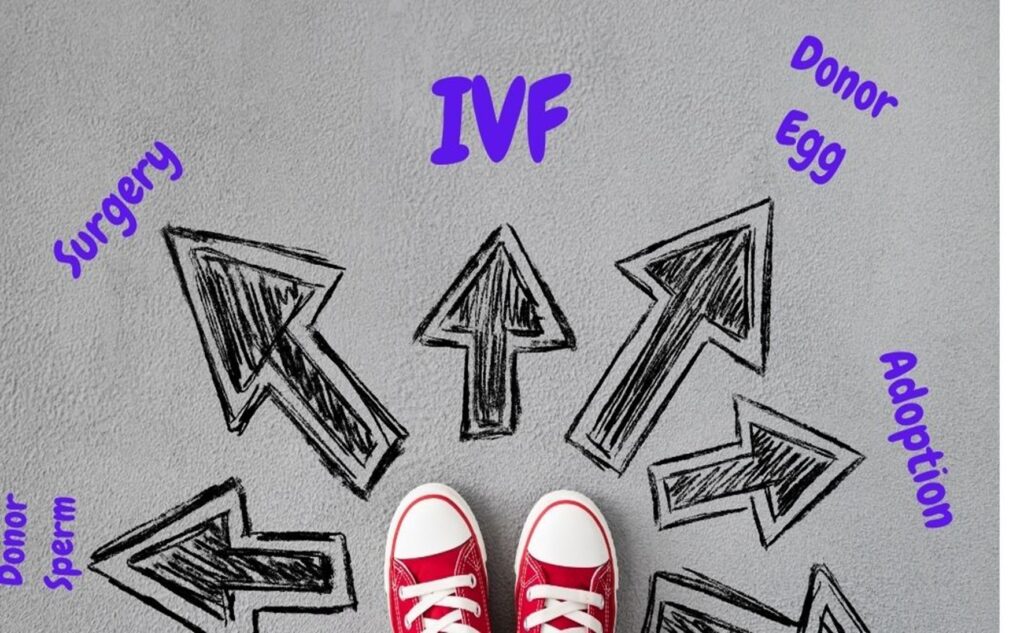Many fertility options are available depending on the cause and diagnosis of the fertility issue. Sometimes, only one person needs treatment, sometimes both partners, and sometimes neither requires treatment, but that person needs someone else to carry the pregnancy. Statistically, about 30% of infertility is due to a female factor, 30% is due to a malefactor, and 30% is unknown.
Speaking to a fertility specialist can help determine which treatments are best for you. However, it is also important to consider at least one consultation with a mental health professional because your psychological health is just as important as your physical health. Your fertility doctor can recommend treatment plans to you. However, the mental health professional can assist you in dealing with the loss of reproductive privacy, how to cope with a fertility issue, and help you carefully consider all available options. This ranges from fertility treatment to third-party fertility treatment to adoption or child-free living. The mental health professional can arm you with coping tools as you venture toward parenting. The good news is that over 85% of people dealing with fertility issues can be treated with low-tech treatment such as medication or surgery. For a small percentage (about 5%) of people dealing with infertility, in vitro fertilization is not enough, and they will need the assistance of another person’s sperm, egg, embryos, or uterus to create their family.
So, when should a consultation with a fertility specialist be considered?
- If you are under the age of 35 years and have been trying to get pregnant for over 12 months.
- If you are over 35 years old and have been trying to get pregnant for over six months.
- If you are over the age of 40 years and have been trying to get pregnant for over three months.
The correlation between age to time in seeking assistance is due to the aging of a woman’s eggs. Women are born with all the eggs they will ever have, and the quality and quantity of the eggs remaining decline over time. By the age of 38 years, a woman’s reproductive ability begins to decline significantly. Women over the age of 40 years have less than a 1% chance of conceiving naturally.
The pathways to parenthood are clearer for a gay male couple or single man: surrogacy, egg donation, and/or adoption, and in a few cases, sperm donation may be needed.
The usual progression for a heterosexual couple, a homosexual female couple, or a single woman who has tried to have a baby unsuccessfully after a year of trying is typical:
- Fertility drugs with intercourse (only applies to heterosexual couples).
- Intrauterine insemination (IUI), with natural cycles, but most often in combination with a low dose of fertility drugs using their own sperm or donor sperm.
- Surgery, if this is an option.
- In Vitro Fertilization (IVF)
- Adoption
- Third-party reproduction includes egg donation, sperm donation, surrogacy, and embryo donation.
The order above is not necessarily the order in which your treatment will or should occur.

Example: Husband, age 46, and wife, aged 40 years (intended parents), try low-dose fertility drugs and intrauterine insemination, but surgery is unnecessary. After several failed in vitro fertilization cycles and two miscarriages, their infertility doctor recommends surrogacy. The egg and sperm from the intended parents are implanted into a surrogate, and the intended parents create four normal genetically tested embryos. After two cycles of transferring an embryo to the surrogate that did not result in a pregnancy, they are rematched with a different surrogate, create another batch of embryos, and again get four normal genetically tested embryos. This surrogate is a repeat surrogate, meaning she carried a successfully delivered surrogacy baby a year earlier. Their second surrogate miscarried after the first embryo transfer attempt, and the second and third attempts were also unsuccessful.
Comments:
- Typically, in a case like this, the infertility doctor will recommend that the Intended Parents switch from their eggs to eggs from a donor and try again with their surrogate.
- BUT is this the right solution? Since infertility affects men and women almost equally, why automatically assume that the woman’s eggs cause the failures? Here is an alternative solution:
- Intended parents should proceed to choose an egg donor.
- Have the intended mother (now close to the age of 42 years) undergo another in vitro fertilization cycle and fertilize these eggs with donor sperm.
- The intended parents have two batches of embryos: one with the intended father’s sperm and donor eggs and one with the intended mother’s eggs and donor sperm.
- Implant the donor egg with the intended father’s sperm OR the mother’s eggs with donor sperm into the intended mother. In this case, there is no objective evidence that her uterus cannot carry a pregnancy.
- If no pregnancy results, implant either embryo into a surrogate.
- It may well be that these parents end up with one child from the intended mother’s egg and donor sperm and another child from the intended father’s sperm and donor eggs.
- Since there is no conclusive evidence that the intended mother’s eggs are causing the failed cycles, creating embryos with the mother’s eggs may be necessary before her egg quality and quantity decline. It is regretful that some infertility doctors automatically conclude that the eggs cause the failures, and moving to an egg donor is recommended.
- If the intended mother fails to produce good-quality embryos, looking at egg donation and the intended father’s sperm is the appropriate solution.
Another option is to pursue adoption while fertility treatments are ongoing. The intended parents can drop one of these options along their journey or create a blended family of much-wanted children.
Getting a second opinion has never hurt anyone. No doctor is always 100% right in their diagnosis or treatment plan recommendation. Doctors are human, too, and use their knowledge, training, and education to offer the best course of treatment. However, medical opinions between doctors can be different, so it is recommended that a second medical opinion be sought before switching from using your genetic material. Sometimes, medical treatment and treatment plans can change quickly, and before a patient has time to process fully, they can no longer use their genetic material to create their family. For this reason, you should consider a consultation with a mental health professional to carefully go over all the options and the associated feelings these options cause to arise.
Thanks to technology, many options are available for all fertility issues. Here are some statistics to help you better understand infertility:
- Ovulation disorders account for about 25% of infertility cases (World Health Organization). Fertility drugs can stimulate ovulation in about 80% of these cases.
- Clomid successfully releases mature eggs in roughly 80% of women who use it (Freedom Fertility Pharmacy), with 10-13% of these achieving a pregnancy.
- Women under the age of 35 years have a 15-20% chance of pregnancy (Merviel et al. – Fertility and Sterility), but women over the age of 40 years have less than 5% chance of pregnancy. For this reason, IUI is not recommended for women over the age of 40 years.
- At https://www.cdc.gov/art/ivf-success-estimator/index.html there is an In Vitro Fertilization Success Estimator, which is a tool for estimating your chance of having a live birth using in vitro fertilization based on experiences of women and couples with similar characteristics.
- Every year, 1.9% of all infants born in the United States are conceived using assisted reproductive technologies (Centers for Disease Control & Prevention).
- Of the 72 million women in the United States aged 15-49 years, for the years 2015-2017, 13% received infertility services.
- Percentage of egg retrievals resulting in live births:
Using Own Eggs
Under 35 years = 52%
35-37 years = 38%
38-40 years = 23%
41-42 years = 11%
- Reasons for using ART according to Centers for Disease Control & Prevention 2018:
Male Factor
Endometriosis
Tubal Factor
Ovulatory Dysfunction
Uterine Factor
PGT
Surrogacy
28%
4%
8%
12%
2%
15%
3%
Diminished Ovarian Reserve
Egg or Embryo Banking
Recurrent Miscarriage
Other, infertility
Other, non-infertility
Unexplained
28%
5%
15%
18%
1%
10%
To answer the question: “Where do I start?” the answer is:
- Consult with your infertility doctor.
- Consider consulting with a mental health professional to analyze and process all the options. It would be best to consult an attorney to understand the laws and parental rights.
- Consider securing a second medical opinion on your treatment plan.
- For women, consider monitoring your hormone levels and egg reserve [follicle stimulating hormone (FSH), (Luteinizing hormone (LH), Estradiol (E2), anti-Müllerian hormone (AMH), antral follicle count (AFC).] These levels and tests will give you a good idea of your egg quality and quantity, and any changes in a woman over the age of 38 should result in a consultation with a fertility doctor.
- For men, consider getting a sperm analysis and maybe banking some sperm. Remember, your sperm replenishes roughly every 90 days, so improving your diet and lifestyle can improve your sperm count, morphology (shape), and motility (movement).
- Do your research. Understand all the options before you and ensure you understand the medical terminology.
Author: Karen Synesiou, Infertility Portal, Inc.


